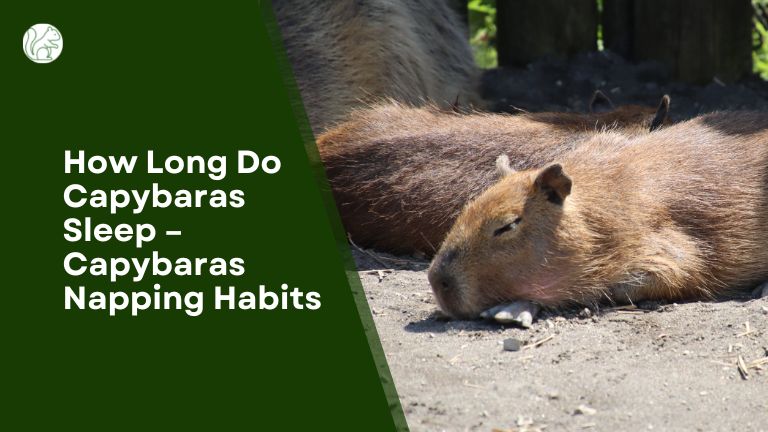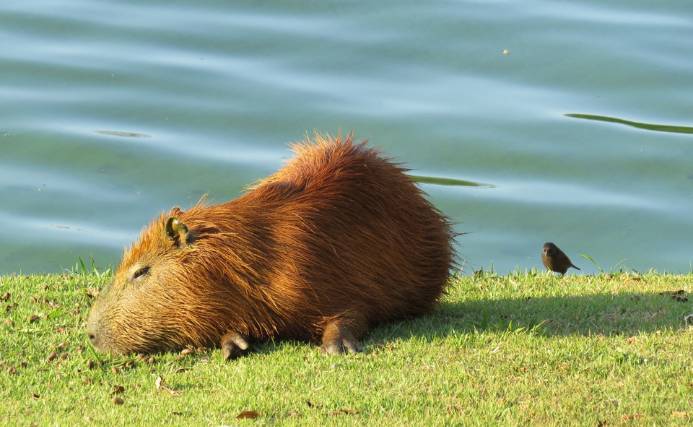Watching a capybara sleep on the couch or outside can give sudden thought about how long they sleep per day. And the answer is pretty SIMPLE.
So, how long do capybaras sleep? The capybaras will sleep for 13 to 15 hours on land + water (including naps) per day. In some cases, they can sleep for up to 16 hours in 24 periods.
With the above 2 lines, you might find it confusing to relate to the topic. That’s why I think of writing this content focusing on this theme with some of the most-asked queries. Enjoy!

Capybaras Sleep For 13 – 15 Hours!
By and large, the capybaras also known as water hogs don’t have a fixed sleeping routine. They sleep for 13 to 15 hours on a daily basis.
Yet, it’s possible that the water hogs doze for more than 16+ hours a day and then get up. This happens if the weather is cold or rainy which makes them lazy to fall asleep easily.
Unlike most animals, they prefer to sleep during the day period when the sun is visible in the sky. In the nighttime, the capybaras do their usual work like playing, eating, peeing, or taking naps.
As the largest member of the rodent family, they have a similar habit of sleeping. FYI, the water hogs do make snore when sleeping deeply.
Just like humans and other animals, sleeping hours do matter in the capybara’s health, safety, mood, and other factors. They just take longer to wake up in order to regain energy.
Exactly How Do Capybara Sleep in Land & Water

Capybaras can sleep on flat land or underwater in a special position that most don’t know. If you are one of those, here’s how they sleep:
How Do Capybaras Sleep in Land?
In the land base, water hogs of any age use their feet to dig a small hole where they sit and sleep. At first, they will start closing their eyes while sitting in the crater-like hole.
When the capybara feels drowsy and needs sleep, they lie in a side way and just goes into its sleeping cycle for a couple of hours.
How Do Capybaras Sleep in Water?
Under the water, the capybaras lift their body under water and rest while their faces stay on top. Their face doesn’t catch water splash during the sleeping period.
They start to go into sleeping mode by closing their eyes and napping. And then, the water hogs will be in the same position for around 1.5 to 2 hours.
Can You Cuddle a Capybara Who Sleeps?
Yes, you can! If you have a small or big capybara, I advise you to cuddle your pet when it sleeps in the bed or on the couch.
The capybara loves and enjoys the moment of cuddling as its body feels human warmth. And this calms the nervous system.
That’s not all, it sometimes can need motherly love which as a pet keeper you have to show care through cuddling or sticking with its body.
Can A Capybara Sleep in Bed?
Well, it depends on the space. The capybara needs a small crater-like bed where it rests and naps making the space warm.
You can use baskets (where it can sleep cozily), bed sheets, or customized beds for the creature to sleep properly. If possible, give it a cushiony pillow to keep the sides warm.
Ending Notes
After knowing how long do capybaras sleep, you must be feeling that humans are not lazy as they sleep for a long period.
Fun Facts:
- The capybaras can go underwater for 5 minutes at one attempt.
- They can sleep on the floor, in water, in bed, or anywhere.
No matter what’s the reason you want to know this, hope it helps you to learn new stuff. Make sure to take care of your pet (if you have one).
See You in The Next Guide!
